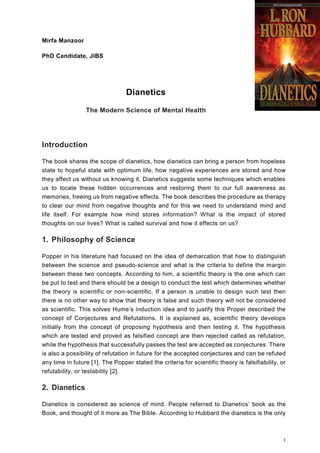About Dianetics
About Dianetics
Blog Article
The Definitive Guide for Dianetics
Table of Contents10 Easy Facts About Dianetics DescribedNot known Facts About DianeticsSome Ideas on Dianetics You Should KnowDianetics - An Overview
I couldn't ever before not intend to obtain anything that comes to mind for you- if it was otherwise, I wouldn't be sitting here with you, doing this. I not only can never ever have a problem, or otherwise wish to listen to something that enters your mind for you, yet I'm totally anxious to recognize every idea, every thought, every picture or feeling that arises or shows up for you- don't ever believe otherwise, and if somehow you do, please simply allow me know! Occasionally, you may have an idea, and picture, concept or incident appear that does not appear to respond to the inquiry, or relate to it, yet nevertheless, constantly do inform me concerning it, and as we continue, the importance will certainly emerge for you.This is inherent in the basis of handling, and the topic of this discussion: the fundamental roles of the therapist and the client: The fundamental function of the therapist is, unlike "typical training", not to control, which indicates to impose and/or hinder, yet to instead function from the basis of EMPOWERING THE CUSTOMER.

Indicators on Dianetics You Should Know
John Mcmasters shared this fundamental truth splendidly well in one of his talks on Power processing, wherein he describes exactly how he was asked what this "unique flair" was that he had for giving such excellent sessions; he had to assume regarding that for a minute, and spotted that it was what he had not been doing, as well as what he was doing: he wasn't evaluating, judging, computing, or as a matter of fact, producing any kind of ideas, not to mention spoken expressions, after offering the command and while waiting on the computer to finish their solution to their complete satisfaction; he was, simply and just, being present with the computer, and completely interested.
The function of the therapist, showed; that was his "special flair". I have actually had my own experience which taught me this well, extremely early in the video game. In 1982, having actually lately finished my training and teaching fellowship on New Era Dianetics, I was running this on a COMPUTER, and there was a factor in the session where (being a bit wet behind the ears not yet having several hours under my belt as a specialist auditor) the computer seemed to be "taking as well lengthy" to reveal Learn More Here anything vocally after I offered him a command.
This trick ended up being the most valuable payment that John ever before made to the subject of treatment or auditing (Dianetics). In my modest opinion, it is the best contribution that anyone has actually ever made to these subjectsthe application is entirely non-judgemental, non-evaluative, and without any type of idea, advice or opinion.no preconceived schedule for people, or 'levels' that they should do
In Scientology we prided ourselves on not evaluating for individuals. All that truly indicated was that the auditor did not VERBALLY evaluate for the Computer in session.
Dianetics Can Be Fun For Everyone

Any person who had actually ever before seen John audit might not aid but discover a image source special high quality in his bookkeeping."The client's standard duty is to be there with the purpose of relocating the direction click here for more info of their spiritual goals, and to openly and fully reveal and experience whatever materializes for them in answering the questions and performing the instructions in the handling.
This is something to process as needed. Also, individuals frequently have prior experience and/or brainwashing in auditing/processing which, in some means, and to some levels, actually misinforms them into mindsets, concepts and behavior patterns that protect against the complete awareness of these roles, and so they will certainly often tend to prevent the expressing of what comes to mind, as in the examples provided above - Dianetics. * The first, and perhaps foremost instances of mis-indoctrination bring about less than completely smooth and effective sessions, can be discovered in specific elements of the training regimens, or "TR's":"TR's" are frequently an individual's very first, or a minimum of early, experience in Scientology, and while I will certainly go on to clarify what I view as the flaws in concept and technique, however, have a tendency to be significantly restorative, done as they are provided (Hubbard urges that "TR's are not refining, they are educating", however factually, they are both processing AND training)
There is no "failing", and no denial of the reality of this being processing. The emphasis, as it should be, is on experiencing the other person's visibility.
A Biased View of Dianetics

Report this page